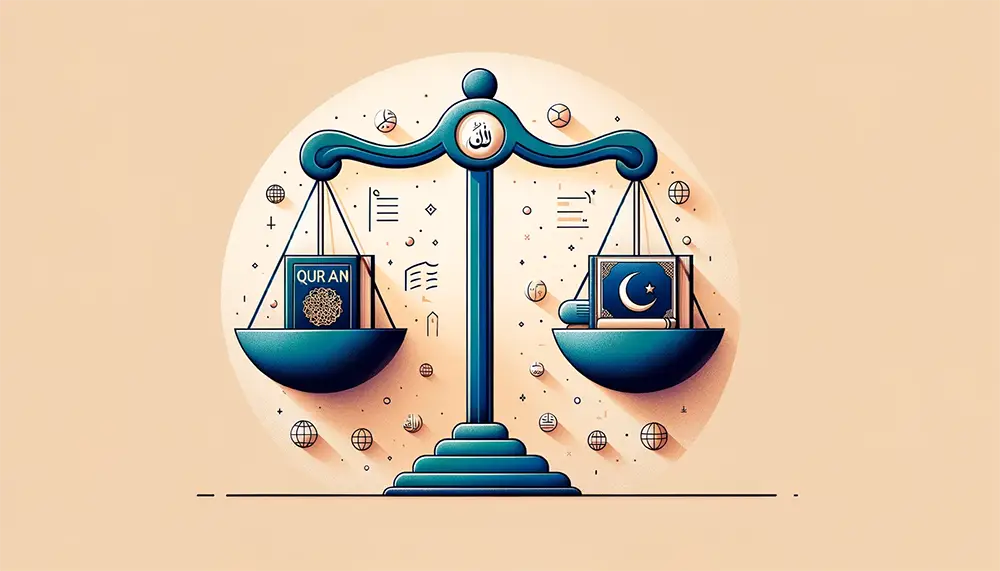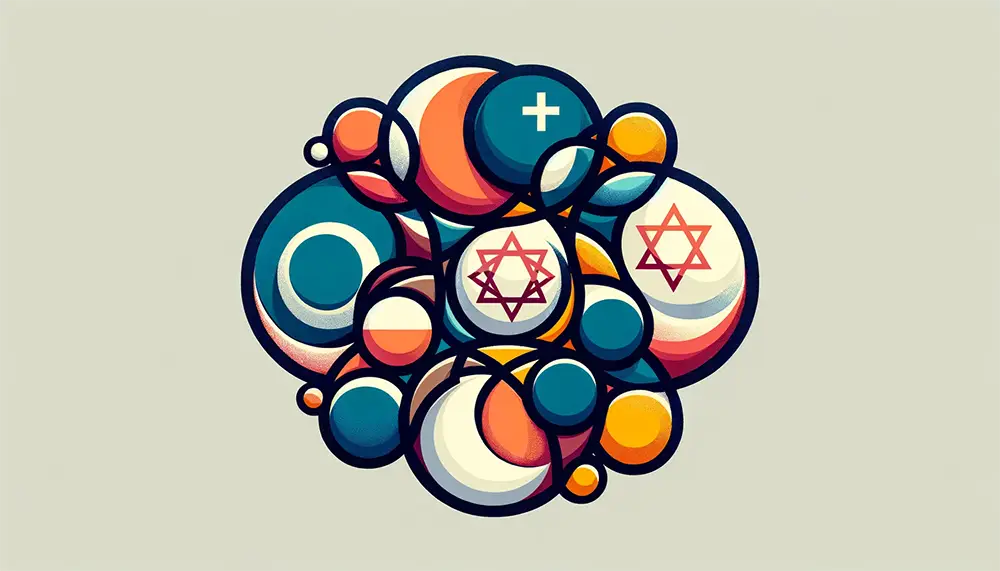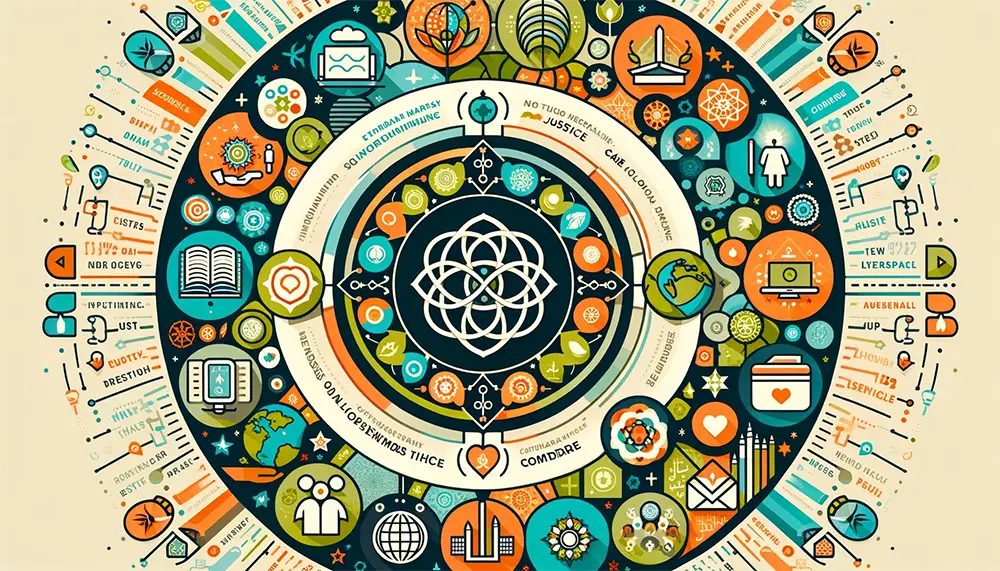Understanding Tawhid: The Oneness of Allah

Introduction to Tawhid
Tawhid, the Islamic concept of monotheism, stands as the cornerstone of a Muslim’s faith. It represents the belief in the absolute Oneness of Allah (اللّٰه), a principle that shapes every aspect of a believer’s life. This article explores this fundamental doctrine, its implications, and its profound impact on the faith and practices of Muslims, or Momins, as we journey through the Quranic teachings, particularly focusing on Surah Al-Ikhlas and the life of Muhammad Rasool Allah ﷺ.
The Quran: A Beacon of Tawhid in Islam
Historical and Quranic Foundations of Tawhid
The Roots of Tawhid in Islamic Tradition
Tawhid, deeply embedded in Islamic history, traces back to the First Prophet Adam (AS). This fundamental concept, central to Islamic belief, emphasizes the uniqueness and singularity of Allah (اللّٰه). The Quran, Islam’s holy book, is replete with verses that highlight this principle. A quintessential example is
Say, He is Allah, [who is] One,
(Quran 112:1)
a verse that not only anchors the belief in Tawhid but also sets the tone for the understanding of divine unity in Islam.
Tawhid Through the Eyes of the Prophet
Prophet Muhammad ﷺ, the final messenger in Islamic tradition, exemplified Tawhid through his life and teachings. His preachings, recorded as Hadiths, form a significant part of Islamic scripture. These teachings continually reinforce the Oneness of Allah, guiding Muslims in their understanding and practice of this principle.

The Dawn of Tawhid in Islamic History
The Quranic Emphasis on Tawhid
The Quran repeatedly emphasizes the concept of Tawhid, making it the bedrock of Islamic theology. Verses such as
Say: He is Allah, the One and Only; Allah, the Eternal, Absolute; He begetteth not, nor is He begotten; And there is none like unto Him.
(Quran 112:1-4)
Abridged Explanation:
Say, O Messenger: He is Allah who is alone in being a deity. There is no deity except Him. He is the master to whom belongs all sovereignty and perfect, beautiful qualities. The one to whom all creation turn to. The one who did not give birth to anyone, nor did anyone give birth to Him. So He has no offspring – may He be glorified – nor any parent. Nor does He have any equal from His creation.
— Abridged Explanation of the Quran
succinctly capture the essence of Tawhid. These verses from Surah Al-Ikhlas are often regarded as the heart of the Quran, summarizing the monotheistic creed of Islam in a few powerful sentences.
The Evolution of Tawhid in Early Islamic History
The concept of Tawhid evolved during the early years of Islam. Before the advent of Islam, the Arabian Peninsula was dominated by polytheistic beliefs. The introduction of Tawhid by Prophet Muhammad ﷺ was revolutionary, challenging the existing belief systems and social structures. This transition from polytheism to monotheism was not just theological but also transformed the socio-cultural landscape of the region.
The Influence of Tawhid on Islamic Civilization
Tawhid has significantly influenced Islamic civilization, guiding its legal, ethical, and social frameworks. The concept of Tawhid helped in unifying the diverse tribes of Arabia under the banner of Islam, leading to the formation of a cohesive Muslim community. This unity was not only theological but also extended to political and cultural dimensions, fostering a sense of brotherhood and solidarity among Muslims.
Tawhid in the Light of Modern Interpretations
In contemporary times, Tawhid continues to be a subject of study and interpretation. Modern scholars and theologians explore its nuances, considering its implications in the current context. The principle of Tawhid is seen as a guiding light for issues ranging from social justice to environmental stewardship, demonstrating its timeless relevance.
The Concept of Allah in Islam

Allah’s Attributes: Omnipotence and Omniscience
Allah: Beyond Human Comprehension
In Islam, the concept of Allah (اللّٰه) is profound and transcends human understanding. Allah is described in the Quran as Al-Qadir (The All-Powerful), and Al-‘Aleem (The All-Knowing), among other attributes. These qualities distinctly set Him apart from the deities of other faiths and are central to the Islamic understanding of God. This exploration delves into these divine attributes and their significance in comprehending Tawhid, the Oneness of Allah.
Al-Qadir: The Omnipotence of Allah
Allah’s attribute of Al-Qadir, His omnipotence, is a key aspect of Islamic theology. It signifies that Allah has unlimited power over all creation. This is encapsulated in the Quranic verse,
The lightning almost snatches away their sight. Every time it lights [the way] for them, they walk therein; but when darkness comes over them, they stand [still]. And if Allah had willed, He could have taken away their hearing and their sight. Indeed, Allah is over all things competent.
(Quran 2:20)
This omnipotence is a cornerstone in understanding the concept of Tawhid, as it asserts that all power and strength come solely from Allah, making Him singular and unique in His essence.
Al-‘Aleem: The Omniscience of Allah
The attribute of Al-‘Aleem highlights Allah’s all-encompassing knowledge. This is beautifully depicted in the verse,
And with Him are the keys of the unseen; none knows them except Him. And He knows what is on the land and in the sea. Not a leaf falls but that He knows it. And no grain is there within the darknesses of the earth and no moist or dry [thing] but that it is [written] in a clear record.
(Quran 6:59)
This profound understanding that Allah is all-knowing reinforces the concept of Tawhid by acknowledging that His wisdom and knowledge are incomparable and exclusive to Him alone.
The Mercy of Allah: Al-Rahman and Al-Rahim
In Islam, Allah is also deeply associated with mercy, often referred to as Al-Rahman (The Most Merciful) and Al-Rahim (The Especially Merciful). These attributes, frequently mentioned in the Quran, emphasize Allah’s compassionate nature. As stated in the Quran,
Your Lord is All-Forgiving, full of mercy. Had He wished to take them to task for their doings, He would have hastened in sending His scourge upon them. But He has set for them a time-limit which they cannot evade.
(Quran 18:58)
This mercy is a vital component of Tawhid, illustrating that Allah’s Oneness encompasses not only His power and knowledge but also His boundless mercy.
Allah’s Uniqueness: Nothing Like Unto Him
One of the most emphatic declarations of Tawhid in the Quran is,
the Originator of the heavens and earth. He has given you spouses of your own kind, and pairs of livestock; by which He causes you to multiply. There is nothing like unto Him, and He is the All-Hearing, the All-Seeing.
(Quran 42:11)
This verse asserts that Allah’s attributes and essence are incomparable to anything else in existence. It underscores the concept of Tawhid by affirming that Allah’s nature is unique and cannot be equated with any of His creations.
The Concept of Tawhid in Understanding Allah
Tawhid, the Oneness of Allah, is the thread that ties together all these attributes. It is the acknowledgment and affirmation that Allah is singular in His essence, attributes, and actions. This understanding shapes the Islamic worldview, influencing how Muslims perceive the world, their purpose in life, and their relationship with the Creator.
Surah Al-Ikhlas: A Pillar of Tawhid
The Essence of Surah Al-Ikhlas
Surah Al-Ikhlas (Arabic: سورة الإخلاص) holds a distinguished place in Islamic theology as it concisely and profoundly encapsulates the concept of Tawhid, the Oneness of Allah. This Surah, comprising just four verses, is often considered the essence of the Quran’s message about Allah’s nature.
In-depth Analysis of Surah Al-Ikhlas
Verse 1: “Say, “He is Allāh, [who is] One,”
The Surah begins with a powerful declaration (Quran 112:1), affirming Allah’s singularity and uniqueness. This verse lays the foundation for the concept of monotheism in Islam, distinguishing Allah from the multiple deities prevalent in pre-Islamic Arabia.
Verse 2: “Allāh, the Eternal Refuge.”
This verse (Quran 112:2) refers to Allah as As-Samad (الصَّمَد), meaning the Eternal Refuge or the Self-Sufficient. It signifies that Allah is the ultimate source of all creation, independent of any needs, emphasizing His completeness and sovereignty.
Verses 3-4: “He neither begets nor is born, Nor is there to Him any equivalent.”
These verses (Quran 112:3–4) address two critical aspects: first, they reject the notion that Allah has offspring or parents, a belief held in various religions; second, they assert that there is nothing comparable to Allah, highlighting His unparalleled nature.
The Significance of Surah Al-Ikhlas in Islamic Worship
Surah Al-Ikhlas is not only a theological cornerstone but also holds great significance in Islamic worship. It is recited in daily prayers, during special occasions, and is considered equivalent to one-third of the Quran in terms of its theological value. This is based on the Hadith where Prophet Muhammad ﷺ said,
Narrated Abu Sa`id Al-Khudri:
A man heard another man reciting: Surat-ul-Ikhlas ‘Say: He is Allah, the One and he was repeating it. The next morning he came to Allah’s Messenger (ﷺ) and mentioned the whole story to him as if he regarded the recitation of that Sura as insufficient On that, Allah’s Messenger (ﷺ) said, “By Him in Whose Hand my soul is! That (Al-Ikhlas) equals one-third of the Qur’an.”
(Sahih Bukhari: 6643)
The Role of Surah Al-Ikhlas in Understanding Tawhid
Surah Al-Ikhlas plays a crucial role in understanding and internalizing the concept of Tawhid. It provides a clear and concise description of Allah’s nature, serving as a constant reminder of His Oneness and the basis of Islamic monotheism.
The Universal Message of Surah Al-Ikhlas
The universal appeal of Surah Al-Ikhlas lies in its straightforward yet profound message. It transcends time and place, offering insights into the nature of the Divine that are relevant to Muslims and non-Muslims alike, encouraging a deeper contemplation of the Creator’s essence.
Types of Tawheed in Islamic Theology
Exploring the Facets of Tawheed
Islamic theology intricately categorizes the concept of Tawheed (the Oneness of Allah) into three distinct types: Tawheed al-Rububiyyah (Lordship), Tawheed al-Uloohiyyah (Worship), and Tawheed al-Asma’ wa al-Sifat (Names and Attributes). Each type focuses on a different aspect of the relationship between Allah and His creation, offering a comprehensive understanding of Islamic monotheism.
Tawheed al-Rububiyyah: The Oneness of Divine Lordship
Defining Tawheed al-Rububiyyah
Tawheed al-Rububiyyah refers to the belief in the unique and exclusive lordship of Allah. It encompasses the understanding that Allah is the sole creator, sustainer, and controller of the universe. This concept is eloquently presented in the Quran,
Indeed, your Lord is Allāh, who created the heavens and the earth in six days and then established Himself above the Throne, arranging the matter [of His creation]. There is no intercessor except after His permission. That is Allah, your Lord, so worship Him. Then will you not remember?
(Quran 10:3).
Implications of Tawheed al-Rububiyyah
The acceptance of Allah’s sole lordship has profound implications on a Muslim’s faith. It instills the belief that all events occur by the will of Allah, and He alone has the power to alter the course of the universe. This belief nurtures reliance and trust in Allah, shaping the Muslim worldview.
Tawheed al-Uloohiyyah: The Oneness of Worship
Understanding Tawheed al-Uloohiyyah
Tawheed al-Uloohiyyah emphasizes the worship of Allah as the only deity. It is the acknowledgment that all forms of worship, whether prayer, fasting, or charity, should be directed exclusively to Allah. This is reflected in the Shahada, the Islamic testimony of faith, which declares, “There is no god but Allah.”
The Role of Worship in Tawheed al-Uloohiyyah
This type of Tawheed reinforces the purpose of human existence as defined in the Quran,
And I did not create the jinn and mankind except to worship Me.
(Quran 51:56)
It guides Muslims to dedicate their acts of worship solely to Allah, affirming His Oneness in their daily lives.
Tawheed al-Asma’ wa al-Sifat: The Uniqueness of Allah’s Names and Attributes
Defining Tawheed al-Asma’ wa al-Sifat
Tawheed al-Asma’ wa al-Sifat focuses on the uniqueness of Allah’s names and attributes. It involves believing that Allah possesses names and attributes that are befitting to His majesty and perfection and that these names and attributes cannot be attributed to anyone else in their complete sense.
The Significance of Allah’s Names and Attributes
The Quran says,
Allah – there is no deity except Him. To Him belong the best names.
(Quran 20:8)
Understanding and reflecting upon Allah’s names and attributes, such as Al-Rahman (The Most Merciful) and Al-Hakeem (The All-Wise), deepens a believer’s knowledge of Allah, enhancing their relationship with Him.
Tawhid and the Life of a Momin
Daily Reflections of Tawhid
Tawhid, the concept of the Oneness of Allah, profoundly influences the daily life of a Momin (believer). It extends beyond mere theological belief, shaping the worship, ethical conduct, and social interactions of Muslims. This section explores how the principles of Tawhid mold a believer’s life, providing practical examples and guidance.
Worship Centered Around Tawhid
The Role of Prayer in Affirming Tawhid
For a Momin, daily prayers (Salah) are not just ritualistic practices but a constant reaffirmation of Tawhid. Each prayer begins with the recitation of Al-Fatiha, which highlights Allah’s unique role as the Master of the Day of Judgment. The Shahada, proclaimed in every prayer, is a direct testament to Tawhid, declaring,
There is no god but Allah.
Fasting and Tawhid
During Ramadan, fasting serves as a reminder of Allah’s sovereignty and the importance of submission to His will. As Allah says in the Quran,
O you who have believed, decreed upon you is fasting as it was decreed upon those before you that you may become righteous.
(Quran 2:183)
This practice enhances the consciousness of Allah (Taqwa), reinforcing the principle of Tawhid.
Ethical Conduct Guided by Tawhid
Integrity in Business and Personal Dealings
Tawhid instills a sense of accountability and integrity in a Momin’s life. Business and personal interactions are conducted with honesty and fairness, as they are considered acts of worship. The Prophet Muhammad ﷺ said,
Narrated Isma’il bin ‘Ubaid bin Rifa’ah:
From his father, from his grandfather, that he went with the Messenger of Allah (ﷺ) to the Musalla, and he saw the people doing business so he said: ‘O people of trade!’ and they replied to the Messenger of Allah (ﷺ) turning their necks and their gazes towards him, and he said: Indeed the merchants will be resurrected on the Day of judgement with the wicked, except the one who has Taqwa of Allah, who behaves charitably and is truthful.’
Abu ‘Eisa said: This Hadith is Hasan Sahih. (Jami` at-Tirmidhi: 1210)
Compassion and Justice in Social Relations
Tawhid encourages compassion and justice in social relations. Understanding that Allah is Al-‘Adl (The Just), a Momin strives to embody fairness in all aspects of life. The Quran states,
Indeed, Allāh commands you to render trusts to whom they are due and when you judge between people to judge with justice. Excellent is that which Allāh instructs you. Indeed, Allāh is ever Hearing and Seeing.
(Quran 4:58).
Tawhid in Personal Development
Seeking Knowledge and Personal Growth
A Momin is encouraged to seek knowledge and personal growth, reflecting on the creations of Allah as signs of His majesty. The pursuit of knowledge is considered a form of worship.
Maintaining Humility and Gratitude
Understanding Tawhid fosters humility and gratitude in a Momin’s heart. Recognizing Allah’s greatness and one’s own limitations leads to a life filled with gratitude. The Quran reminds us,
And [remember] when your Lord proclaimed, ‘If you are grateful, I will surely increase you [in favor]; but if you deny, indeed, My punishment is severe.’
(Quran 14:7)
Tawakkul: Trusting in Allah’s Plan

Navigating Life’s Seas with Trust in Allah
Embracing Divine Will
Tawakkul, the Islamic concept of reliance on Allah, is a natural and profound extension of Tawhid, the Oneness of Allah. This pivotal aspect of faith involves unwavering trust in Allah’s plan, acknowledging that He is the best planner and His wisdom surpasses all human understanding. This section explores how a believer develops Tawakkul, its significance in facing life’s challenges, and its role in decision-making.
Understanding Tawakkul in the Light of Tawhid
The Foundation of Tawakkul
Tawakkul stems from the recognition of Allah’s absolute power and knowledge, as affirmed in Tawhid. It is rooted in the belief that while humans must strive and plan, the ultimate outcome of all affairs rests in Allah’s hands. The Quran states,
So by mercy from Allah, [O Muḥammad], you were lenient with them. And if you had been rude [in speech] and harsh in heart, they would have disbanded from about you. So pardon them and ask forgiveness for them and consult them in the matter. And when you have decided, then rely on Allah. Indeed, Allah loves those who rely [upon Him].
(Quran 3:159).
Tawakkul and Human Effort
A key aspect of Tawakkul is the balance between trusting in Allah and exerting personal effort. It is not a call to passivity; rather, it encourages active striving while placing the final outcome in Allah’s hands.
Tawakkul in Overcoming Life’s Challenges
Facing Adversity with Faith
In times of hardship and uncertainty, Tawakkul becomes a source of strength and solace for believers. It provides the fortitude to face challenges, knowing that Allah’s support is always near. The Quran reassures,
Verily, with every difficulty there is relief.
(Quran 94:6)
emphasizing that Allah’s help accompanies trials.
The Role of Patience and Perseverance
Tawakkul is closely linked with patience (Sabr) and perseverance. It involves enduring difficult circumstances with a hopeful and positive attitude, trusting that Allah’s plans are for the ultimate good. The Prophet Muhammad ﷺ said,
Suhaib reported that Allah’s Messenger (ﷺ) said:
Strange are the ways of a believer for there is good in every affair of his and this is not the case with anyone else except in the case of a believer for if he has an occasion to feel delight, he thanks (God), thus there is a good for him in it, and if he gets into trouble and shows resignation (and endures it patiently), there is a good for him in it.
(Sahih Muslim: 2999).
Tawakkul in Decision Making
Guided Choices Through Istikhara
When making decisions, a Momin seeks guidance through Istikhara (prayer for guidance), a practice that embodies Tawakkul. It involves sincerely asking Allah to guide one to the best decision and then proceeding with full trust in His decree.
The Assurance of Divine Wisdom
Tawakkul gives believers the confidence that whatever Allah decrees is the best possible outcome, even if it seems otherwise in the moment. This assurance enables them to make choices without fear or anxiety, fully reliant on Allah’s wisdom and knowledge.
The Impact of Tawhid on Islamic Society and Culture
Shaping a Unified Community
Tawhid, the Islamic principle of the Oneness of Allah, profoundly impacts Islamic society and culture, extending far beyond personal beliefs. It lays the foundation for Islamic laws, societal norms, and cultural expressions, fostering a sense of unity and cohesiveness among Muslims. This section will explore how the concept of Tawhid influences various aspects of Muslim society.
Tawhid and Islamic Law

Balancing Worldly Laws with Divine Guidance
The Foundation of Shariah Law
Tawhid forms the bedrock of Shariah, the Islamic legal system. It dictates that laws should be based on the Quran and Hadith, reflecting the belief in Allah’s supreme authority. This adherence to divine guidance ensures that the laws are not just a set of rules but a manifestation of Allah’s will, aimed at ensuring justice and welfare for all.
Guiding Ethical and Moral Conduct
The principles of Tawhid influence the ethical and moral framework within Islamic law. It reinforces the idea that every action, whether public or private, is accountable to Allah. This accountability guides Muslims to act justly and ethically, following the path laid out by Allah.
Tawhid in Social Norms and Practices
Fostering Community Cohesion
Tawhid encourages a sense of brotherhood and unity among Muslims. The belief in one God creates a bond that transcends ethnic, racial, and national differences, fostering a global community united in faith. This unity is exemplified in practices like the Hajj pilgrimage, where Muslims from all over the world gather in Mecca, standing shoulder to shoulder in worship.
Social Justice and Equality
The concept of Tawhid also promotes social justice and equality. The Quran states,
O mankind, indeed We have created you from male and female and made you peoples and tribes that you may know one another. Indeed, the most noble of you in the sight of Allāh is the most righteous of you. Indeed, Allāh is Knowing and Aware.
(Quran 49:13)
This verse highlights the equality of all humans in the eyes of Allah, encouraging fair treatment and respect for all.
Cultural Expressions Influenced by Tawhid
Art and Architecture
Tawhid has significantly influenced Islamic art and architecture. The avoidance of depicting living beings in reverence to Allah’s unique ability to create life, has led to the development of intricate geometric patterns and calligraphy. These art forms are not only aesthetically pleasing but also serve as reminders of the divine.
Literature and Poetry
Islamic literature and poetry often reflect themes of Tawhid, expressing love, awe, and dependence on Allah. Poets like Rumi and Hafez have woven concepts of divine unity into their works, creating a rich literary tradition that celebrates and contemplates the nature of the Creator.
Tawhid in Comparative Religious Context

Exploring Monotheism Across Different Faiths
Monotheism Across Faiths
While Tawhid is a concept deeply rooted in Islam, the idea of monotheism, the belief in a single, supreme deity, is a theme that spans across various world religions. This comparative study explores the similarities and differences in the understanding of God in Islam and other major faiths, providing insights into how monotheism is interpreted and practiced differently across religious traditions.
Tawhid in Islam: The Absolute Oneness of Allah
The Core of Islamic Belief
In Islam, Tawhid is the absolute and uncompromising belief in the Oneness of Allah. It is not just the belief in one God, but also the belief that this one God is indivisible, has no partners, children, or equals. The Quran states,
Say, ˹O Prophet,˺ “He is Allah—One ˹and Indivisible˺; Allah—the Sustainer ˹needed by all˺. He has never had offspring, nor was He born. And there is none comparable to Him.”
(Quran 112:1-4) — Dr. Mustafa Khattab, the Clear Quran
This underlines the uniqueness and singularity of Allah in Islam.
Monotheism in Christianity: The Trinity
Understanding the Trinity
Christianity is based on monotheistic principles, but it introduces the concept of the Trinity, which includes God the Father, God the Son (Jesus Christ), and the Holy Spirit. While Christians believe in one God, they understand Him as a triune entity. This differs significantly from the Islamic view of Tawhid, where any division of God’s nature is strictly rejected.
Monotheism in Judaism: The Shema
The Jewish Declaration of Faith
Judaism, like Islam, emphasizes the absolute Oneness of God. The Shema, a central declaration of faith in Judaism, states, “Hear, O Israel: The Lord our God, the Lord is one.” (Deuteronomy 6:4). This bears a resemblance to the Islamic concept of Tawhid, highlighting a strict monotheism without the concept of a Trinity or multiple divine entities.
Hinduism: A Complex Understanding of Monotheism
Variations in the Hindu Concept of God
Hinduism presents a more complex understanding of monotheism. It is often perceived as a polytheistic religion due to its myriad of deities. However, many Hindus view these deities as different aspects or manifestations of a single, supreme reality, or Brahman. This understanding shares some similarities with Islamic Tawhid in the sense of ultimate divine unity but differs in the expression and perception of that divinity.
Buddhism: An Alternative Perspective
The Non-Theistic Approach
Buddhism stands apart as it is essentially non-theistic and does not focus on the worship of gods. While it doesn’t advocate a creator deity like in monotheistic religions, some Buddhist traditions emphasize qualities like compassion and wisdom, which can be considered divine. This presents a contrast to Tawhid, which firmly centers around the belief in and worship of Allah.
Tawhid: A Path to Spiritual Enlightenment

Seeking Spiritual Enlightenment through Tawhid
The Spiritual Journey Through Tawhid
Tawhid, the Islamic doctrine of the Oneness of Allah, is more than a mere theological concept; it is a transformative path leading to spiritual enlightenment. This journey through Tawhid not only deepens a believer’s understanding of Allah but also guides them towards inner peace and profound spiritual growth. Let’s explore the multifaceted ways in which Tawhid enriches the spiritual life of a believer.
Unveiling the Essence of Tawhid
Beyond Theological Understanding
Tawhid is not just about acknowledging Allah’s oneness; it’s about internalizing this truth in every aspect of life. It involves recognizing Allah’s omnipresence and seeing His hand in everything. This recognition brings a believer closer to Allah, fostering a deeper, more intimate relationship with the Creator.
Tawhid and the Quest for Inner Peace
Finding Solace in Divine Unity
The belief in Tawhid offers immense inner peace. It reassures the believer that everything happens by Allah’s will, providing a sense of security and serenity even in turbulent times. The Quran encapsulates this beautifully:
Those who believe, and whose hearts find satisfaction in the remembrance of Allah: for without doubt in the remembrance of Allah do hearts find satisfaction.
(Quran 13:28).
This verse highlights how remembering and reflecting on Allah, a practice rooted in Tawhid, brings tranquility to the heart.
Tawhid and Spiritual Growth
Nurturing Faith Through Knowledge
Understanding Tawhid encourages the pursuit of knowledge about Allah and His creation, which is a form of worship in Islam. This quest for knowledge not only increases a believer’s faith but also enhances their understanding of the purpose and meaning of life, leading to spiritual growth and enlightenment.
Tawhid in Daily Life
Living a Life Aligned with Divine Will
Tawhid impacts the daily life of a believer, guiding their actions, intentions, and interactions. Living a life aligned with the principles of Tawhid means constantly striving to please Allah in every deed, word, and thought. This continuous effort to embody Tawhid in one’s life is a journey towards spiritual perfection.
Tawhid: The Path to Ultimate Success
Attaining Spiritual Fulfillment
Tawhid, ultimately, is the path to achieving success in both this world and the hereafter. It shapes a believer’s worldview, aligning their goals and aspirations with what is pleasing to Allah. This alignment ensures a life of fulfillment, purpose, and spiritual prosperity.
Tawhid and Contemporary Issues

Applying Tawhid in Addressing Modern World Challenges
Applying Ancient Wisdom to Modern Problems
The principles of Tawhid, though ancient, hold profound relevance in addressing the myriad of challenges faced in our modern world. This section delves into how the timeless teachings of Tawhid can be applied to contemporary issues such as environmental care, social justice, and global harmony.
Tawhid and Environmental Stewardship
The Islamic Perspective on Nature
In the light of Tawhid, nature is a creation of Allah, deserving respect and protection. The Quran states:
And there is no creature on [or within] the earth or bird that flies with its wings except [that they are] communities like you. We have not neglected in the Register a thing. Then unto their Lord they will be gathered.
(Quran 6:38).
This verse implies a kinship between humans and the natural world, advocating for environmental stewardship as a form of worship and a reflection of a believer’s recognition of Allah’s Oneness.
Tawhid and Social Justice
Upholding Equality and Fairness
Tawhid teaches that all humans are equal in the eyes of Allah, which lays the foundation for social justice. This principle challenges societal structures that perpetuate inequality and injustice. The Quran’s emphasis on fairness:
O you who have believed, be persistently standing firm in justice, witnesses for Allāh, even if it be against yourselves or parents and relatives. Whether one is rich or poor, Allāh is more worthy of both. So follow not [personal] inclination, lest you not be just. And if you distort [your testimony] or refuse [to give it], then indeed Allāh is ever, of what you do, Aware.
(Quran 4:135)
resonates strongly with contemporary movements for social equality and human rights.
Tawhid and Global Harmony
Fostering Peace and Understanding
The concept of Tawhid transcends individual and communal differences, advocating for a global community united in faith and purpose. This unity, based on the common belief in one God, can be a powerful force in promoting interfaith dialogue, understanding, and peace in a world often divided by religious and cultural differences.

United in Faith: The Global Impact of Tawhid
Conclusion: Embracing Tawhid in Everyday Life
In conclusion, Tawhid is much more than a theological doctrine; it is a comprehensive way of life for every Momin. It offers an in-depth understanding of Allah’s nature, shapes moral and ethical conduct, and provides a robust framework for societal harmony. By living in accordance with the principles of Tawhid, Momins cultivate a deeper connection with their Creator, contributing to a community united in faith and purpose. The application of Tawhid’s teachings in addressing contemporary challenges further demonstrates its enduring relevance and the vital role it plays in guiding believers through the complexities of modern life. Tawhid, therefore, remains a beacon of spiritual, ethical, and communal guidance, essential for navigating the challenges of the contemporary world while maintaining a firm foundation in faith.
Frequently Asked Questions
- What is the Concept of Tawhid in Islam?
Tawhid in Islam is the belief in the absolute Oneness and uniqueness of Allah. It is the fundamental principle that Allah is singular, without partners, equals, or offspring, and is the sole creator and sustainer of the universe. - How Does Tawhid Influence a Muslim’s Daily Life?
Tawhid influences a Muslim’s life by dictating their worship practices, ethical behavior, and social interactions. It guides them to act justly, be responsible, and treat others with compassion, reflecting their belief in Allah’s unity. - What are the Different Types of Tawheed in Islamic Theology?
Islamic theology categorizes Tawheed into three types: Tawheed al-Rububiyyah (Lordship), Tawheed al-Uloohiyyah (Worship), and Tawheed al-Asma’ wa al-Sifat (Names and Attributes), each focusing on different aspects of the relationship between Allah and His creation. - What is the Significance of Surah Al-Ikhlas in Understanding Tawhid?
Surah Al-Ikhlas is significant in understanding Tawhid as it concisely encapsulates the essence of Allah’s oneness. Its verses reject the notion of Allah having offspring or equals and affirm His singularity and uniqueness. - How is Tawhid Applied to Contemporary Issues?
Tawhid’s principles apply to contemporary issues by promoting environmental care, social justice, and global harmony. It advocates for responsible stewardship of nature, equality, fairness, and peace, reflecting the belief in a unified creation under one God. - What is Tawakkul and How is it Related to Tawhid?
Tawakkul is the Islamic concept of trusting in Allah’s plan and is a natural extension of Tawhid. It involves having faith in Allah’s wisdom and timing, balancing personal effort with reliance on Allah’s guidance and decree.
Lorem Ipsum


One Comment
Creation of the Universe in Quran: (We are [its] expander)
January 31, 2024 AT 6:20 am[…] the universe’s origin but also reinforces the faith of a Momin in the unparalleled power of Allah (اللّٰه). In this exploration, we delve into various Quranic verses that shed light on how the universe was […]